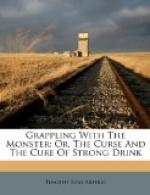GENERAL IMPAIRMENT OF THE FACULTIES.
In a more recent lecture than the one from which we have quoted so freely, Dr. Richardson, speaking of the action of alcohol on the mind, gives the following sad picture of its ravages:
“An analysis of the condition of the mind induced and maintained by the free daily use of alcohol as a drink, reveals a singular order of facts. The manifestation fails altogether to reveal the exaltation of any reasoning power in a useful or satisfactory direction. I have never met with an instance in which such a claim for alcohol has been made. On the contrary, confirmed alcoholics constantly say that for this or that work, requiring thought and attention, it is necessary to forego some of the usual potations in order to have a cool head for hard work.
“On the other side, the experience is overwhelmingly in favor of the observation that the use of
“ALCOHOL SELLS THE REASONING POWERS,
“make weak men and women the easy prey of the wicked and strong, and leads men and women who should know better into every grade of misery and vice. * * * If, then, alcohol enfeebles the reason, what part of the mental constitution does it exalt and excite? It excites and exalts those animal, organic, emotional centres of mind which, in the dual nature of man, so often cross and oppose that pure and abstract reasoning nature which lifts man above the lower animals, and rightly exercised, little lower than the angels.
IT EXCITES MAN’S WORST PASSIONS.
“Exciting these animal centres, it lets loose all the passions, and gives them more or less of unlicensed dominion over the man. It excites anger, and when it does not lead to this extreme, it keeps the mind fretful, irritable, dissatisfied and captious.... And if I were to take you through all the passions, love, hate, lust, envy, avarice and pride, I should but show you that alcohol ministers to them all; that, paralyzing the reason, it takes from off these passions that fine adjustment of reason, which places man above the lower animals. From the beginning to the end of its influence it subdues reason and sets the passions free. The analogies, physical and mental, are perfect. That which loosens the tension of the vessels which feed the body with due order and precision, and, thereby, lets loose the heart to violent excess and unbridled motion, loosens, also, the reason and lets loose the passion. In both instances, heart and head are, for a time, out of harmony; their balance broken. The man descends closer and closer to the lower animals. From the angels he glides farther and farther away.




